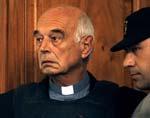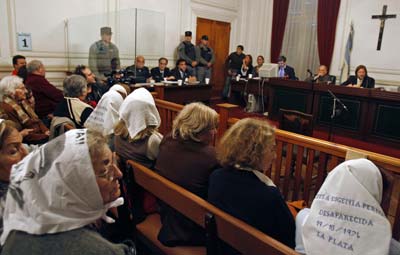Catholic church on trial in Argentina

A Catholic priest is on trial in Argentina accused of being involved in the deaths of seven people and 31 instances of torture. By Hiram Morgan
The Catholic Church is on trial in South America. Amid Argentina's usual political crises and footballing scandals, the prosecution of a Catholic priest for involvement in the murder of seven people continues to grow in prominence. The trial now in session for a month is in La Plata. It was a cold, clear southern winter's day when I visited the court house in this pretty university town 50 kilometres south of Buenos Aires to which it is linked by a ribbon of shanty towns along the River Plate.
The imposing neo-classical court house is surrounded by temporary metal fencing and armed guards but getting through security and entering the trial chamber itself was relatively informal. Clearly it is a matter of seeing justice done in public. A battery of TV cameras are there recording the whole thing. It is live on one public channel and the rest are ready to go “vivo y directo” if anything dramatic is disclosed. At the front of the audience sit the mothers of the Plaza de Mayo in their symbolic white scarves with the names of deceased or missing victims inscribed on them. The president of the court, Dr Carlos Rozansky, appears more like an old-style academic in a tweed-jacket, long-hair and beard than a judge. Witnesses are questioned facing him and the other tribunal members rather than facing the court as in Ireland's common law system.The defendant and his lawyers are behind safety glass in one corner and when the former was temporarily brought up from the cells to be identified by a witness he was in a bullet proof vest.
The man on trial is Christian Von Wernich, a 69 year old priest, who was chaplain to the military police of Buenos Aires province during the dirty war of the 1970s when some 30,000 people were ‘disappeared' by the junta. Many were thrown into the sea from aircraft. He is accused of involvement in seven deaths, 31 instances of torture and 42 cases of illegal detention. Statements claim that he went as far as to subject prisoners to pretend executions in order to extract information. Most significant was the abuse of his position as a priest in the case of the seven deaths. He used this to gain the confidence of the internees in order to gather intelligence about their activities and fellow activists. But also he used his priestly status win over their families whom he promised to assist in getting their loved ones released abroad and even obtained money from them to do so. All the while he was in fact colluding in murder. Von Wernich has been under arrest since 2003 when he was discovered by a journalist in a parish in Chile where the church had relocated him under a false identity. Although he is one on trial, so too, by proxy, is the former hierarchy of the Argentine church who conspired and collaborated with the military in their assumption of power and the subsequent reign of terror.
There are 120 witnesses due to give evidence. They are more likely in need of protection than Von Wernich because in last year's trial of one of the military, the key prosecution witness – Julio Lopez – also ‘disappeared'. The day I visited the court room the witnesses included Maria Molina born whilst her mother who subsequently disappeared was in prison. Luckily she was not given away to childless military couples as many were. The point at issue here was that Von Wernich had witnessed her baptism certificate though his defence team was trying to question its authencity. Another impressive witness was Lucy Gomez de Mainer, a stately white-haired woman in a red coat. Two of her children, Pablo and Magdalena had disappeared though Magdalena had clearly been in detention and had encountered Von Wernich because she was mentioned on Maria Molina's baptismal lines as having stood godparent for her. Lucy Mainer related how she and another daughter, Maricel, had ended up being detained and tortured in a different interrogation centre after their home had been attacked and bombed by security agents. She complained about how Von Wernich had taken advantage of Pablo and Magdalena who had strong religious sentiments. Crucially it was Maricel who was able to identify Von Wernich to the court because after her own release he had been pointed out to her by Magdalena on a visit to see her siblings before they disappeared. In the course of her testimony Maricel was also asked by the judge if she could remember other people in the centre where she had been held. To this she replied that there was a Catholic Priest “of the name Patricio... I don't know anything more about him and I think he has gone from the country. He was very badly tortured but celebrated a Mass for us with dry bread and a chalice made out of cigarette paper. I am not a believer but it was the most moving Mass I ever took part in...”.
My companion, who was interpreting the court proceedings for me that day, was taken aback when he realised that he was the Fr Patricio she was referring to. This was Paddy Rice, a veteran human rights worker, originally from Fermoy, County Cork. Afterwards Paddy introduced himself to the Mainers whom he had not seen for thirty years. A coincidence? Well not really. Paddy Rice was a missionary priest working as a carpenter amidst the poor of the Villa Soldati slum when he was arrested in 1976. He was subjected to hooding, water-torture, continuous electric shocks, and near lynching until he was released after the intervention of the Department of Foreign Affairs. After living in Venezeula and giving up the priesthood, Paddy returned to Buenos Aires in the mid-1980s where he re-met and married Fatima who had been arrested and tortured at the same time. Since then he had worked tirelessly to bring the perpetrators of the crimes of the 1970s to justice. He had come to La Plata to advise the judge on canon law because Von Wernich is refusing to answer questions by claiming that the seal of confession as a pretext. Later we returned to Paddy's Buenos Aires house, which he has recently modified to include a classroom for visiting international students of human rights. There he related over a cup of Barry's Tea how he had served communion in the prison corridor. “Maricel could not believe it when she saw me again today. We were in cells next to one another and as I was getting good food after seeing the Irish Ambassador Wilfred Lennon and his secretary Justin Harman, I used pass her some of the food...”.
Hiram Morgan was part of a University College Cork delegation speaking at Universidad del Salvador in Buenos Aires.
